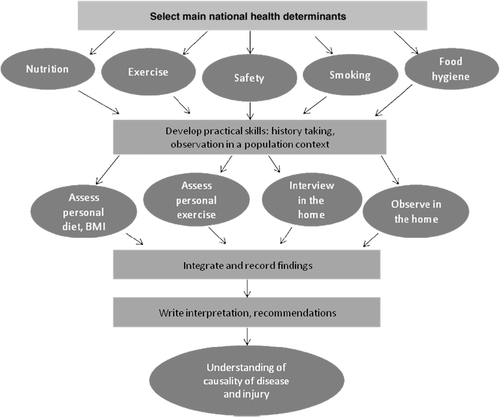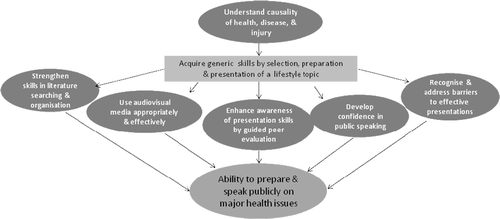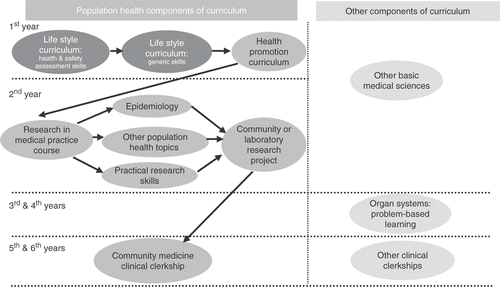Abstract
Background: Lifestyle factors are major determinants for health and safety. Although many graduates lack interviewing and observational skills for prevention and student lifestyle often deteriorates during training, few medical schools teach comprehensive assessment of lifestyle, particularly in the context of the home environment.
Aims: A lifestyle curriculum was developed to teach basic causality and provide practical experience in assessing nutrition, exercise, safety, tobacco addiction, and food hygiene, together with generic skills in history taking, on-site observation, researching and presenting.
Methods: Lifestyle has been integrated into the first-year curriculum, evaluated, and improved at the United Arab Emirates University since 2001. After an introduction to determinants of health, students conduct a home interview and observational survey for family residential and traffic safety, smoking, and food hygiene. For nutrition and exercise, students assess personal lifestyle. Generic skills are developed in the context of lifestyle. Evaluations were by faculty and students, including assessed impact on knowledge, skills, and personal lifestyle. The lifestyle curriculum was compared with other countries by detailed search.
Results: Detailed evaluation found strong agreement/agreement among students that knowledge had improved on: counselling of patients and families 97%, promoting healthy lifestyles 100%; interviewing 88%; history taking 84%; using research for medical practice 89%; and importance of prevention 96%. Eighty six percent were stimulated to think in new ways about health. Improved personal diet was reported by 60% (p < 0.0004) and exercise by 55% (p < 0.0004), while 36% of non-users started wearing a safety belt in front (p < 0.0004) and 20% in the rear (p = 0.008). Literature review found comprehensive lifestyle curricula to be rare.
Conclusions: A lifestyle curriculum developed prevention-oriented history-taking and observation skills for health maintenance, addressing health priorities, improving medical student lifestyle, and strengthening generic skills. Since lifestyle is a major determinant of health, medical schools should consider development of an appropriate curriculum to address their local and national health priorities.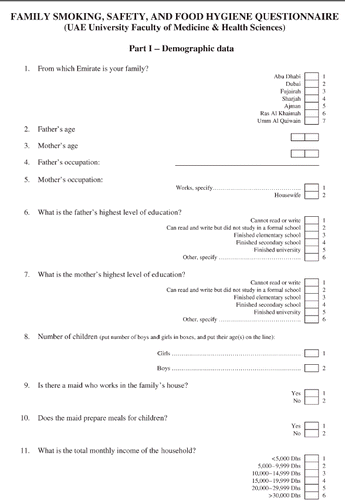
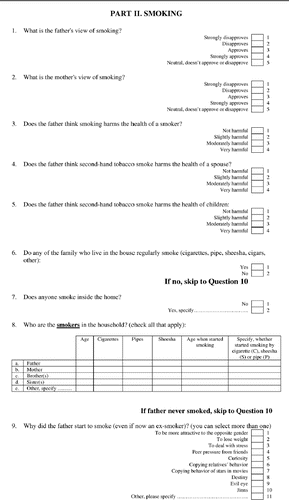
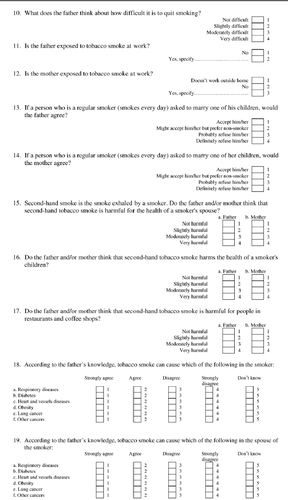

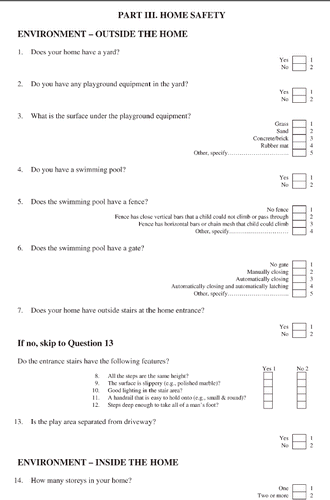
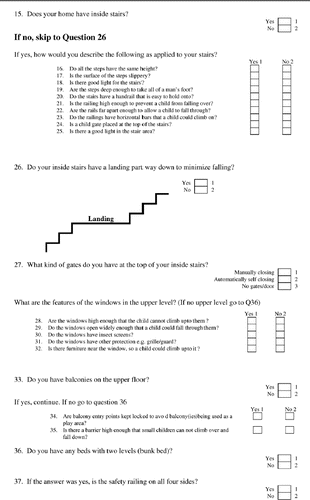
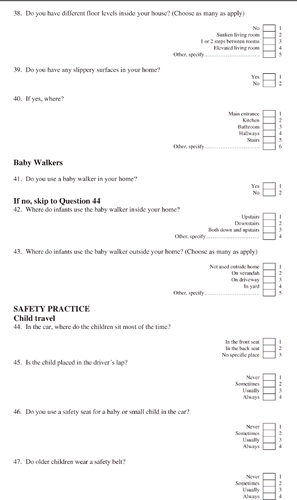
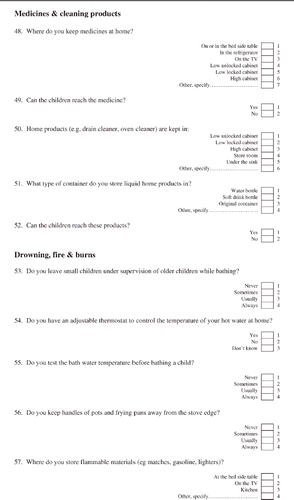
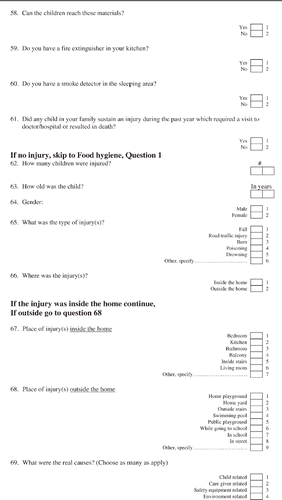
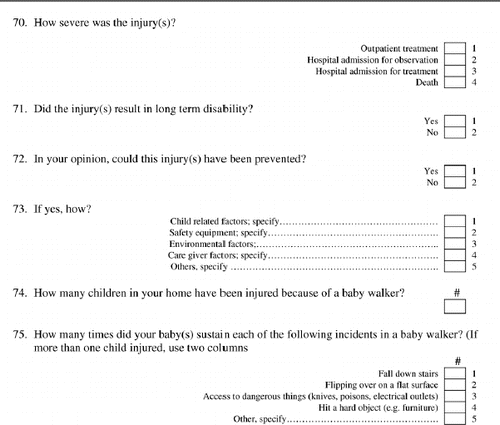
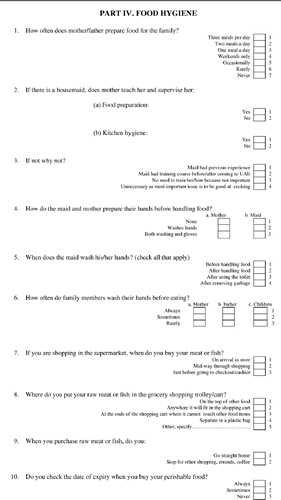
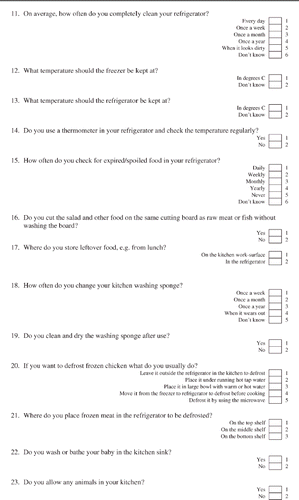
Introduction
According to the World Federation for Medical Education, the improved health of all peoples is the main goal of medical education, and it is also the overall mission of the Federation (International Association of Medical Colleges Citation2001). In this sweeping context, training of medical students in the theory and practice of population health is no longer a luxury but a central element of medical education. While competencies in population-based prevention are now considered essential for practicing physicians (Cleary Citation2003) and some medical schools teach patient counselling in clinic settings, few faculties have developed a strong curriculum in population health based on primary prevention in family and home settings. It is scarcely surprising that most graduates are unprepared to provide population-based prevention.
In the United Kingdom, as part of their 1993 recommendations on undergraduate medical education Tomorrow's Doctors, the General Medical Council declared public health medicine should be a prominent theme in the medical curriculum and should include health promotion and illness prevention, assessment and targeting of population needs, and the importance of environmental and social factors in disease (General Medical Council Citation1993). Five years later, the Council carried out an assessment and found that all but a few exceptional medical schools had failed to succeed in giving public health the high profile it deserved. This failure was attributed to a low profile for public health medicine due to lack of stimulating teaching methods and shortage of funds for good faculty (Bligh Citation2002; Christopher et al. Citation2002; Gillam & Bagade Citation2006).
The Institute of Medicine in the United States also emphasized the importance of training in population health for all medical students in both 1988 and 2003. As in the United Kingdom, practical problems in implementation have been noted (Tilson Citation2006).
Key determinants of health, disease, and injury of populations and subpopulations include risk factors described collectively as ‘lifestyle’ (Last Citation2001). Medical students not only arrive lacking knowledge about fundamentals of lifestyle, but in many universities personal lifestyle and perceptions about the importance of prevention deteriorate during their studies (General Medical Council Citation1993; Delnevo et al. Citation1996; Bligh Citation2002; Christopher et al. Citation2002; Carter et al. Citation2003; Centers for Disease Control and Prevention Citation2005; Cape et al. Citation2006; Gillam & Bagade Citation2006; Spencer et al. Citation2006).
When they qualify and begin practice, such physicians provide a poor role model for patients and communities (Abramson et al. Citation2000; Frank et al. Citation2000). Hence many American and Canadian medical schools have begun to introduce health promotion and support groups for students (Wolf & Scurria Citation1995). An issue of great practical importance is the inability of many medical students and primary care residents to take histories and provide appropriate education and advice to patients, populations, or communities on topics such as injury prevention for families (Phillips et al. Citation1993; Wright & Litaker Citation1998; Xiang et al. Citation2000; Ball & Bax Citation2002; Vekefiliu et al. Citation2002).
Although a few medical schools have introduced teaching of counselling on at least one lifestyle factor with patients in a health facility (Conroy et al. Citation2004; Centers for Disease Control and Prevention Citation2005), few if any teach a more comprehensive assessment of lifestyle and environmental assessment in a community setting (Garr et al. Citation2000) in order to provide the social and environmental awareness recommended by the General Medical Council (Christopher et al. Citation2002).
In response to a study of our medical students’ unhealthy lifestyles in 2000 (Carter et al. Citation2003), including inappropriate diet and exercise, failure to use safety restraints in motor vehicles, as well as insufficient knowledge of prevention in a community setting, a lifestyle curriculum was developed to introduce first-year students to the main national determinants of health, disease, and injury and to develop practical skills useful for both populations and patients. Such skills would be acquired in the environment where people live, play and work, as contrasted with standard teaching of history taking and physical examination in health facilities with patients. Community Medicine initiated the programme and it evolved in collaboration with Medical Education, who perceived that lifestyle issues would provide a rich source of topics for presentations, searching medical literature, and written synthesis of findings; such ‘generic skills’ are typically weak in new medical students (Whittle & Murdoch-Eaton Citation2004).
The lifestyle curriculum was developed to provide early introduction to:
main national health determinants, including nutrition, exercise, safety, smoking;
practical skills in interviewing, history taking, and observation, specifically oriented to assessment of determinants of health for individuals and families in a population setting;
a healthy and safe personal lifestyle, to protect students’ health and allow them to serve as models for patients and communities;
basic concepts for more advanced phases of the public health medicine and population curriculum;
transferable generic skills.
Methods
Student population and setting
First-year students in a 6-year programme, all UAE Arab nationals and about 75% female, at the national medical school in Al Ain, United Arab Emirates; the language of instruction is English.
Curriculum content
This includes four main elements:
Introduction to lifestyle and causality of health, disease and injury. Five lectures introduce main national determinants of health, emphasising history taking and conduct of an observational home survey.
Family lifestyle history and home observational survey. Each student identifies a family with one or more children willing to receive a home visit to assess smoking, injury, and food hygiene by interview and observation. Students are instructed not to advise families, but to formulate recommendations in their reports.
Personal lifestyle history. Students log their nutritional intake and physical activity for a week and complete an assessment using appropriate software; this includes measurement of their body mass index.
Oral presentation. Each student chooses one aspect of a healthy lifestyle and prepares and delivers a short presentation.
Faculty roles
Community Medicine plays a coordinating and primary teaching role on health determinants. Medical Education supports development of independent learning skills through a process approach, emphasising drafting, editing, revision, and solving problems with personal written expression; methods include peer editing and one-to-one counselling.
Student assessment
Knowledge of health determinants is evaluated by questions in unit examinations. Fieldwork is assessed by three in-class reports, with access to their completed family questionnaire which is submitted with their report; findings for each determinant in the family's lifestyle are summarized and evaluated, including recommendations and barriers to change. Reports are graded for substantive content by community medicine faculty and for language appropriate to academic discourse by medical education.
Students are also graded on their personal nutrition and exercise assessments, on written responses to several pages of questions on the role of nutrition and exercise in improving and maintaining health, and on their individual oral presentation.
Evaluation of the lifestyle curriculum
The programme was assessed and improved annually, including efficiency and acceptability in meeting main objectives (Goldie Citation2006). Evaluations consisted of written feedback from students, written and verbal review of student and faculty critiques, and assessment of performance on main topic objectives by reports of home visits and personal lifestyle and by presentations. Student presentations were categorized by main determinants for academic years 2004–2007, verifying congruency with national public health priorities. In 2007, a structured evaluation of students was undertaken by an anonymous self-administered questionnaire, including scaled responses, with 21 questions on knowledge and skills development, 16 on changes in personal lifestyle, and 8 on broader aspects of community medicine and population health. For a comparative review, papers on lifestyle teaching in other medical schools were identified using Google Scholar and Pub Med, searching on overall and specific determinants, in all languages.
Results
Description of lifestyle curriculum
The curriculum has evolved into two main phases, including development of:
knowledge of health determinants and competence in field assessment of family lifestyle, hazards in the home, and personal lifestyle;
generic skills in researching, writing, and presentation.
Phase one
Health determinants selected for national priorities are reviewed with students. Practical skills are developed in this context (), contributing to understanding of causality of health, disease and injury. These determinants, excepting food hygiene, are leading causes of mortality and/or morbidity in the UAE. During field work with a family, students learn to conduct interviews on determinants of health, and document injury hazards and food hygiene by observation. Detailed evaluation of personal lifestyle is also practiced; the logs are reviewed by one faculty and remain confidential. Home interviews and observational surveys are done by structured questionnaire using closed-ended questions with sections on family safety, smoking, and food hygiene (electronic version available via link).
Phase two
Each student chooses a topic to research and present in greater depth, developing generic skills (). Public presentations are attended by colleagues and other students and interested faculty from all departments. Depth of understanding is tested and enhanced by questions and comments from audience.
Integration with other curriculum
The first two medical science years are divided into five units of about two months' duration. The lifestyle curriculum is part of the third and fourth units of the first year, followed in the fifth by a health promotion curriculum (). These years also include curriculum on other public health topics related to research for medical practice, such as population survey research, epidemiology, biostatistics, and other public health substantive topics such as injury epidemiology, prevention, and management, together with a community or laboratory research project. The final-year community medicine clerkship incorporates a rapid field survey and/or intervention for a target population, review of epidemiology, biostatistics, and research methodology, and more advanced topics such as disease and injury reporting and death certification, disease outbreaks, and occupational medicine.
Lifestyle presentation topics selected by students
Topics (n = 130) during 2004–2007 generally reflected national health priorities of injury, cancer, and cardiovascular diseases: nutrition/diet 37% (n = 48), injury prevention/safety 20% (26), exercise 15% (20), smoking 5% (6), food hygiene 2% (2), and others 22% (28). While students consistently had free choice of topics, they needed guidance on understanding which potential topics were congruent with the main public health priorities; during one year when faculty were not available to guide them, 42% (21/50) of presentations were in the ‘other’ category and of marginal or no public health significance.
Examples of topics included: child obesity, traffic safety for the family car, yoga of praying, weight loss in nursing homes, children and second hand smoke, stairway safety, osteoporosis and exercise, junk food, safety for agricultural workers, safety of children's toys, home and yard safety, diet and hypertension, and food-borne diseases.
Evaluation and evolution of the lifestyle curriculum
Results of the final evaluation are presented first, followed by brief summaries of annual evaluations and resulting improvements of the curriculum.
(a) Structured student evaluation
A comprehensive student evaluation was done in 2007; 87% (27/31) of females and 84% (16/19) of males were present and responded. Over 90% of students agreed or strongly agreed they had met most lifestyle objectives for awareness, knowledge, and skills ().
Table 1. Impact of lifestyle curriculum on development of knowledge and skills of first-year medical students, United Arab Emirates University 2007 (n = 43)
As for personal lifestyle, students reported major changes in diet, exercise, and use of safety belts (). Overall views of the lifestyle curriculum were positive ().
Table 2. Impact of lifestyle curriculum on personal lifestyle of first-year medical students, United Arab Emirates University 2007 (n = 43)
Table 3. Overall evaluation of lifestyle curriculum by first-year medical students, United Arab Emirates University 2007 (n = 43)
(b) Annual evaluation of faculty and students, issues, & improvements
Several issues were identified and improved.
Scope and duration of family interview. When the project was initiated it was based around home interview of a family, including assessment of nutrition and exercise for the family members, as well as safety, smoking, and food hygiene. This task was challenging for students new to interviewing; hence the programme was modified. Family interview and observation were retained for safety, smoking, and food hygiene, while each student also reported on their personal food intake and exercise.
Quality of literature searching. In the next evaluation, review of student reports found most using lay health sources rather than international and regional academic and research-based citations. Hence the curriculum guide and grading were revised to include quality of references, and students were actively encouraged to refer to sources such as the World Health Organization's websites and journals such as Injury Prevention and Tobacco Control.
Difficulty with writing and grading of reports. A subsequent evaluation found that while students were meeting key objectives, even the more limited referenced written family report was difficult for native Arabic speakers to complete in English, and task design did not adequately discourage plagiarism, collusion, or even fabrication. All-inclusive reports were time consuming to grade since each essay was first assessed by medical education language faculty, and then the three public health professors who taught the different determinants of lifestyle covered in the family report all graded the report by sifting through the sections for material relevant to their specialist area. The comprehensive report was therefore modified to three separate 45-minute in-class reports on fieldwork in safety, smoking, and food hygiene; reference to their completed questionnaire was permitted and the relevant section was submitted with each report. These were faster to grade as topics were kept separate. In-class writing tasks also militate against plagiarism.
As for personal nutrition and exercise, students initially had to write an essay report to evaluate their one-week logs. This task was replaced by submission of the log and an analysis of it, together with short-answer questions and case studies.
(4) Design of appropriate questionnaires. Students prepared or retrieved by internet questionnaires and checklists; field observations of home safety practices and environment were suitable for prevention of falls, drowning, and traffic injuries.
Nonetheless, such publicly available material tends to be designed for different populations where priorities are different. Since questionnaire design is a complex blend of science and art, it was challenging to train students to design questionnaires on key prevention items for history-taking and observation in the limited time available.
Hence in 2007 it was decided that community medicine faculty would design appropriate data collection instruments for all students to use, drawing upon questionnaires previously piloted in surveys of home and traffic safety, smoking, and food handling. This provided a consistent locally appropriate interview format for all students in which aspects of the three determinants were covered, analogous to standard forms for learning patient history taking. Injury hazards frequently identified included unsafe stairs, slippery floor surfaces in wet areas, hard surfaces in home playgrounds, swimming pools without automatic safety gates, and non-use of safety restraints in vehicles. Exposure to risk from active and passive smoking at home, work, and recreation, as well as hazards of food storage and handling were also documented.
Informal student comments
• ‘Keeping the food and activity log helped me realise the flaws in my lifestyle pattern.’
• ‘Perhaps I could allocate 30 minutes a day for walking with my friend instead of sitting and talking.’
• ‘The lifestyle project made us really think about our life-styles and our own health, so we made positive changes’ (final year female students, five years after project).
• ‘Professor, why are you eating that? I have lost 10 kilos by eating a healthier diet and regular exercising’ (Third-year male student, previously obese, two years after project, observing professor eating cheesecake).
Discussion
Overview
In many hot-climate regions of the Middle East, lack of exercise in lethal synergy with pervasive marketing of junk food pose a major threat to health; overweight, obesity, and diabetes are prevalent. Although smoking has been uncommon among females and older males, large advertising budgets, seldom employed to heighten awareness of danger, increasingly lure vulnerable children and youth into the most dangerous of addictions. Infrequent use of safety restraints and other hazards lead to many avertable unintentional injuries, with major loss of life years and productivity. A positive point is that overt abuse of alcohol is uncommon, and advertising of alcoholic beverages is generally prohibited in Islamic countries.
Against this background, a lifestyle curriculum introduces fundamental concepts of causality and enables students to apply them in family and personal assessment, learning first-hand about barriers to ideals of lifestyle. Preparation for presentations in the context of enhanced critical awareness enables pursuit of personal interests, providing a range of interesting topics. The curriculum helps students develop early in training a solid background for public health epidemiology, injury and disease prevention, and health promotion. This enriches choices of later group research, and many choose population topics, expanding the scope beyond laboratory, later arriving well-prepared with positive views for the clinical clerkship in community medicine. Enhanced writing and presentation skills are beneficial throughout training and later careers.
To provide an international context for considering the UAE lifestyle curriculum, the findings of our review of publications on lifestyle curricula are summarized below, including general and determinant-specific research, medical-student lifestyle, and generic skills. Interpretation should be cautious, mindful of potential publication biases that could affect reporting.
Comparisons–general lifestyle curriculum
While medical schools in some countries have begun to train students in patient assessment and/or counselling for certain modifiable lifestyle factors (Conroy et al. Citation2004; Houston et al. Citation2006; Pederson et al. Citation2006; Spencer et al. Citation2006; Kosowicz et al. Citation2007), and a few in population health concepts (Trevena & Clarke Citation2002; Trevena et al. Citation2005), hardly any reported comprehensive teaching on all main lifestyle factors and none on interviewing and observation in the home for families, prior to sickness or injury.
Comparisons–curricula for specific lifestyle determinants
Safety
Since injury is the leading source of loss of economic life years and a main cause of death, trauma and safety have prominent roles in both our overall and lifestyle curricula. Around the world, sufficient training in injury epidemiology and prevention and safety promotion is uncommon in medical schools and tends to be fragmented throughout the curriculum (Butler et al. Citation1998; Wright & Litaker Citation1998; Villaveces et al. Citation2005). Special skills are needed so graduates are capable of effective communication with patients, other professionals, and their community when hazards are discovered during clinical practice (Martinez Citation1998).
Nutrition
Although new students arrive with deficits in knowledge on fundamentals of nutrition (Makowske & Feinman Citation2005), adequate teaching is delivered by only a minority of medical schools in the United States (Adams et al. Citation2006); formal training lags behind gains in basic and applied medical nutritional science (Wong et al. Citation2004). While nearly all faculty expected students to routinely obtain information about nutrition from patients, most did not teach them nutrition counselling for patients; indeed, faculty lacked the nutrition fundamentals necessary to do so. In Lithuania, both first and third year medical students had unhealthy diets, with only 20% in conformity with World Health Organization Guidelines on fruits and vegetables (Skemiene et al. Citation2007). More positively, a course on nutrition in preventive medicine at Harvard in the United States improved second-year students’ confidence in dietary counselling, and their personal diets (Conroy et al. Citation2004).
Exercise
In the United States, first-year medical students’ attitudes towards health promotion, disease prevention, and exercise were one of the main predictors of physical fitness levels (Liang et al. Citation1993). Despite the importance of exercise and U.S. students’ belief that it would be highly relevant for future practice to provide exercise counselling for patients (Frank et al. Citation2004), exercise as a topic for the medical curriculum is rarely reported (Ritchie et al. Citation2002; Del Corral Citation2007); one medical school in the United States reported an elective course on exercise physiology and cardiovascular fitness and one in Hungary taught exercise counselling in a course of human movement sciences (Cohen et al. Citation1988; Angyán Citation2004). The preventive medicine course for Harvard students described above under nutrition also increased confidence in exercise counselling; however, most students reported no improvement in personal exercise (Conroy et al. Citation2004). While reports suggest medical students in the United States and some other countries such as Nepal are generally reasonably fit (Pramanik & Pramanik Citation2001; Peterson et al. Citation2003; Frank et al. Citation2004), the situation appears less positive in central Europe and the Middle East (Bakr et al. Citation2002; Nieradko & Borzecki Citation2003; Skemiene et al. Citation2007). The above findings are of great concern since the human body has not evolved to cope with biological effects of physical inactivity; no single intervention, possibly excepting diet modification, has greater promise than physical exercise to reduce the risk of virtually all chronic diseases (Booth et al. Citation2000).
Tobacco, alcohol & other drugs
The relative danger of tobacco, alcohol, and other drugs for medical students and the general population varies considerably by international region due to cultural, religious, commercial, and political factors. Although harming the body is forbidden by The Noble Qur’ân and the Hadith, in contrast with alcohol surprisingly few controls on marketing and sales of tobacco products are evident in Islamic countries. With smoking a leading cause of preventable death in many countries, it is alarming that many medical schools provide relatively little teaching (Powers et al. Citation2004) about specific health effects, and that counselling skills are deficient (Mostafa & Shokeir Citation2002; Harrabi et al. Citation2006).
Smoking is uncommon among our UAE medical students, 4% or less and nearly all males (Carter et al. Citation2003); however, in other countries prevalence ranged from about 10–40%. In Saudi Arabia, Pakistan, Egypt, and southern India, 11–14% of medical students were reported as regular smokers (Abolfotouh et al. Citation1998; Mostafa & Shokeir Citation2002; Khan et al. Citation2005; Al-Turki Citation2006; Mohan et al. Citation2006). In Europe the situation may be worse, with 41% of Greek, 22% Italian, 21–32% Polish, 18% Spanish, and 15% German medical students smoking (Mas et al. Citation2004; Kowalska et al. Citation2006; Rea & Tortorano Citation2006; Sichletidis et al. Citation2006; Sieminska et al. Citation2006).
As for trends, while in Ireland the situation improved between 1973 and 2002 with a drop from 29% to 9% (Boland et al. Citation2006), the reverse occurred in central Europe between 1995 and 2004, with an increase in the Slovak Republic from 11% to 22% among male students and 5 to 12% among females, while in Lithuania smoking among female students doubled (Veryga & Stanikas Citation2005). The latter trend could be linked to massive post-communist exposure to tobacco marketing and merits further study. In Tunisia, the situation deteriorated during medical studies, with regular smoking reported in 4% of first-year and 17% of final-year students (Harrabi et al. Citation2006).
Since alcohol consumption by Muslims (The Noble Qur’ân) and advertising are forbidden in UAE, it is not surprising that only 1% of our students reported consuming alcohol, although this might underreport the true situation (Carter et al. Citation2003). The picture differs in some Western European countries such as Ireland and Germany, where heavy and binge drinking, as well as use of other drugs, are increasingly frequent among medical students (Boland et al. Citation2006; Keller et al. Citation2007). Alcohol abuse and use of other drugs are more common among smokers, including medical students in Europe (Anand et al. Citation2006; Keller et al. Citation2007). In Brazil, medical students reportedly use numerous drugs, even volatile solvents (Di Pietro et al. Citation2007).
Comparisons–personal lifestyle for future physicians
Some medical schools provide personal lifestyle and psychological counselling for medical students (Wolf & Scurria Citation1995), but generally not in the context of overall family health and safety. International differences in personal lifestyle of medical students appear substantial, with better diet and exercise among students in North America than Europe (Skemiene et al. Citation2007). Many medical students in high-income oil producing countries struggle to cope with heavily marketed junk foods and to obtain sufficient exercise in a tropical climate. In Asia, where most medical students have a normal body mass index, as many as 16% are underweight, and want to be so (Sakamaki et al. Citation2005). In some lower income countries, mental distress from poverty is a greater problem than obesity (Shariati et al. Citation2007), while in western Europe exhaustion was associated with poor health, especially among females (Dahlin et al. Citation2007).
Such differences appear poorly studied, but could reflect variability in teaching by medical schools, role modelling by faculty (Frank et al. Citation2004; Rego & Dick Citation2005), cultural and religious diversity in acceptability of smoking, alcohol, and use of other drugs, national diet, marketing practices for unhealthy food and tobacco, and possibly greater maturity of students in countries where medicine is a postgraduate programme.
Although physicians with a healthy lifestyle are more active in encouraging such lifestyle among patients (Abramson et al. Citation2000; Frank et al. Citation2000) and a survey of medical school deans found many strongly believed physicians should model health behaviour (Frank et al. Citation2004), students reported poor modelling of population and preventive health by faculty (Rego & Dick Citation2005).
Comparisons–generic presentation and researching skills
With Arabic as their mother tongue, written expression in English is a challenge for UAE students. While our lifestyle curriculum helps address such needs by providing practice in verbal and written presentation, the necessity for training in generic skills is not confined to medical schools where English is the second language of students. In the United Kingdom, some of the weakest lifelong generic learning skills of entering students were presenting, communicating with doctors and other scientists, and researching a topic using library resources (Whittle & Murdoch-Eaton Citation2004). Even weaker was the ability to communicate scientific and medical ideas to non-scientists; for this, our health promotion curriculum provides practical training and experience with laypeople, using focus groups. In summary, development of practical generic skills linked to a lifestyle curriculum should be helpful for many medical schools.
Limitations and future research needs
The lifestyle curriculum has been evaluated during eight years, and is well supported by other departments and administration. Nevertheless, assessment of personal lifestyle included only self-reported behaviour change. In the future, evaluation by assessment of measured impact on students’ own lifestyles before and at some time after completing training would be desirable. While anecdotal observation and feedback on weight loss, exercise and decreased use of elevators indicate that the curriculum has benefited students’ health, it would be useful to reassess objective indicators of lifestyle such as body mass index. This could be undertaken in medical schools before and after introduction of such curricula.
Without controls, assessing impact on health counselling in primary care clinics might pose a challenge, but could be feasible. A problem with longitudinal assessment is confounders such as other teaching and peer influences; hence proving causality could be difficult, even with periodic reassessment of student lifestyles and correlation with quality of patient histories and counselling on prevention during primary care rotations. In our setting, such an evaluation could be problematic but might be feasible elsewhere were curricular evaluation begun prior to introduction, by use of historical controls or by comparison with other medical schools not using the curriculum. Another possibility could be targeting a subgroup of final-year students or primary care residents with a lifestyle curriculum, while assessing their work with patients, as compared to controls, perhaps sequentially so all would receive the intervention. Such training would be justified since the literature encourages better skills in teaching prevention priorities to patients. However, in countries such as the UAE, where so much morbidity and mortality result from new and rapidly changing lifestyle factors, it would be irresponsible, even unethical, to withhold lifestyle training until the final years.
Our choice of lifestyle issues was guided by data on national priorities of preventable health conditions, including traffic and home injury and chronic diseases (Ministry of Health Citation2004; Al Belooshi et al. Citation2006), as well as available expertise of faculty. Since abuse of alcohol and drugs other than nicotine is less evident in UAE society than in many non-Islamic countries, these issues were not included. Gastrointestinal infections associated with poor food hygiene are a major public health issue in many low-income countries. Although not a main determinant of mortality and hospitalization in the UAE, the topic is of practical importance in a tropical climate, adds another dimension to home observation, and allows colleagues specialized in infectious disease epidemiology to participate.
Conclusion
Medical educators should consider developing a lifestyle curriculum early in students’ training to raise awareness of population health issues, provide a professional approach and practical skills for family and home lifestyle assessment, improve students’ lifestyle, and enhance generic skills. Since population health and student lifestyle determinants vary by culture, religion, education, and commercial interests, medical schools should assess their national public health priorities when developing a lifestyle curriculum.
Since the curriculum described focuses on knowledge and practical assessment skills, it would best be developed in an integrated manner. A logical sequel could be a practical health promotion field project to prepare and evaluate a communication instrument(s) to inform specific subpopulations about a lifestyle issue and to help improve students’ ability to communicate with the general public. Finally, as an introduction to assessing and managing lifestyle in patient settings such as clinics and hospitals, primary care clinical departments could build upon population lifestyle skills by strengthening their curriculum for assessment of patient lifestyle, linked to age and gender-appropriate recommendations for health and safety.
Acknowledgements
Thanks to our former colleague Dr Anne Carter for her initiative in assessment of students’ lifestyles and early development of the lifestyle curriculum. Hussein Al Agab assisted with data analysis and Terri Everest, English lecturer, provided useful feedback after review of the manuscript. Professor Michelle McLean provided helpful comments on the paper as well as suggestions for the final student evaluation.
Declaration of interest: The authors report no conflicts of interest. The authors alone are responsible for the content and writing of the paper.
Additional information
Notes on contributors
Peter Barss
PETER BARSS is Associate Professor, Department of Community Medicine, Faculty of Medicine & Health Sciences, United Arab Emirates University. He has special interests in injury and smoking prevention, population health, and medical education.
Michal Grivna
MICHAL GRIVNA is Assistant Professor, Department of Community Medicine, Faculty of Medicine & Health Sciences, UAE University. He has special interests in child safety and in medical education.
Fatma Al-Maskari
FATMA AL-MASKARI is Assistant Professor, Department of Community Medicine and Associate Dean for Student Affairs, UAE University. She has a special interest in prevention of obesity and diabetes.
Geraldine Kershaw
GERALDINE KERSHAW is Lecturer, Medical Communication and Study Skills, Department of Medical Education, Faculty of Medicine & Health Sciences, United Arab Emirates University.
References
- Abolfotouh MA, Abdel Aziz M, Alakija W, Al-Safy A, Khattab MS, Mirdad S, Al-Juhani A, Al-Humaidi M. Smoking habits of King Saud University students in Abha, Saudi Arabia. Ann Saudi Med 1998; 18(3)212–216
- Abramson S, Stein J, Schaufele M, Frates E, Rogan S. Personal exercise habits and counseling practices of primary care physicians: a national survey. Clin J Sport Med 2000; 10(1)40–48
- Adams KM, Lindell KC, Kohlmeier M, Zeisel SH. Status of nutrition education in medical schools. Am J Clin Nutr 2006; 83(4)941S–944S
- Al Belooshi SH, Al Hosani SM, Al Yamahi AR, Al Zaabi MR, Barss P, Grivna M. What are the real causes of death in the United Arab Emirates? [Abstract]. Emirates Med J 2006
- Al-Turki YA. Smoking habits among medical students in Central Saudi Arabia. Saudi Med J 2006; 27(5)700–703
- Anand JS, Chodorowski Z, Hajduk A, Ciechanowicz R, Waldman W, Wiergowski M. Problems in tobacco smoking in opinion of VI year of medical students. Przegl Lek 2006; 63(10)1052–1053
- Angyán L. Promoting physical activity in medical education. Mini-review. Acta Physiol Hung 2004; 91: 157–166
- Bakr EM, Ismail NA, Mahaba HM. Impact of life style on the nutritional status of medical students at Ain Shams University. J Egypt Public Health Assoc 2002; 77(1–2)29–49
- Ball S, Bax A. Self-care in medical education: effectiveness of health-habits interventions for first-year medical students. Acad Med 2002; 77(9)911–917
- Bligh J. Tomorrow's Doctors: extending the role of public health medicine in medical education. Med Educ 2002; 36: 206–207
- Boland M, Fitzpatrick P, Scallan E, Daly L, Herity B, Horgan J, Bourke G. Trends in medical student use of tobacco, alcohol and drugs in an Irish university, 1973–2002. Drug Alcohol Depend 2006; 85(2)123–128, (Epub 2006 Jun 2)
- Booth FW, Gordon SE, Carlson CJ, Hamilton MT. Waging war on modern chronic diseases: primary prevention through exercise biology. J Appl Physiol 2000; 88: 774–787
- Butler RN, Todd KH, Kellermann AL, Runyan CW, Lynn SG, Rodriguez MA, Zwerling C, Rivara FP. Injury-control education in six U.S. medical schools. Acad Med 1998; 73: 524–528
- Cape G, Hannah A, Sellman D. A longitudinal evaluation of medical student knowledge, skills and attitudes to alcohol and drugs. Addiction 2006; 101(6)841–849
- Carter AO, Elzubeir M, Abdulrazzaq YM, Revel AD, Townsend A. Health and lifestyle needs assessment of medical students in the United Arab Emirates. Med Teach 2003; 25(5)492–496
- Centers for Disease Control & Prevention (CDC). Tobacco use and cessation counselling–global health professionals survey pilot study, 10 countries, 2005. MMWR Morb Mortal Wkly Rep 2005; 54(20)505–509
- Christopher DF, Harte K, George CF. The implementation of Tomorrow's Doctors. Med Educ 2002; 36: 282–288
- Cleary LM. Population-based prevention. Am J Prev Med 2003; 24(4S)161–163
- Cohen JD, Drury J, Wright JR. Promoting exercise and physical fitness in the medical school curriculum. J Med Educ 1988; 63(6)438–441
- Conroy MB, Delichatsios HK, Hafler JP, Rigotti NA. Impact of a preventive medicine and nutrition curriculum for medical students. Am J Prev Med 2004; 27(1)77–80
- Dahlin M, Joneborg N, Runeson B. Performance-based self-esteem and burnout in a cross-sectional study of medical students. Med Teach 2007; 29(1)43–48
- Del Corral P. Translating exercise biology into the Venezuelan medical education and health care system. Invest Clin 2007; 48: 377–388
- Delnevo CD, Abatemarco DJ, Gotsch AR. Health behaviors and health promotion/disease prevention perceptions of medical students. Am J Prev Med 1996; 12(1)38–43
- Di Pietro MC, Doering-Silveira EB, Oliveira MP, Rosa-Oliveira LQ, Da Silveira DX. Factors associated with the use of solvents and cannabis by medical students. Addict Behav 2007; 32(8)1740–1744, (Epub 2006 Dec 19)
- Frank E, Hedgecock J, Elon LK. Personal health promotion at US medical schools: A quantitative study and qualitative description of deans′ and students′ perceptions. BMC Med Educ 2004; 4(1)29
- Frank E, Rothenberg R, Lewis C, Belodoff BF. Correlates of physicians′ prevention-related practices. Findings from the Women Physicians′ Health Study. Arch Fam Med 2000; 9(4)359–367
- Garr DR, Lacklan DT, Wilson DB. Prevention education and evaluation in U.S. medical schools: A status report. Acad Med 2000; 75(7 Suppl)S14–S21
- General Medical Council. Tomorrow's Doctors: Recommendations on Undergraduate Medical Education. General Medical Council, London 1993
- Gillam S, Bagade A. Undergraduate public health education in UK medical schools–struggling to deliver. Med Educ 2006; 40: 430–436
- Goldie J. AMEE Education Guide no. 29: Evaluating educational programmes. Med Teach 2006; 28: 210–224
- Harrabi I, Ghannem H, Kacem M, Gaha R, Ben Abdelaziz A, Tessier JF. Medical students and tobacco in 2004: A survey in Sousse, Tunisia. Int J Tuberc Lung Dis 2006; 10(3)328–332
- Houston TK, Wall T, Allison JJ, Palonen K, Willett LL, Keife CI, Massie FS, Benton EC, Heudebert GR. Implementing achievable benchmarks in preventive health: A controlled trial in residency education. Acad Med 2006; 81(7)608–616
- International Association of Medical Colleges. World Federation for Medical Education (WFME): Basic Medical Education WFME Global Standards for Quality Improvement 2001, Available at URL: http://www.iaomc.org/wfme.htm (accessed 20 October 2008)
- Keller S, Maddock JE, Laforge RG, Velicer WF, Basler HD. Binge drinking and health behavior in medical students. Addict Behav 2007; 32(3)505–515, (Epub 2006 Jul 3)
- Khan FM, Husain SJ, Laeeq A, Awais A, Hussain SF, Khan JA. Smoking prevalence, knowledge and attitudes among medical students in Karachi, Pakistan. East Mediterr Health J 2005; 11(5–6)952–958
- Kosowicz LY, Pfeiffer CA, Vargas M. Long-term retention of smoking cessation counseling skills learned in the first year of medical school. J Gen Intern Med 2007; 22(8)1161–1165, (Epub 2007 Jun 8)
- Kowalska A, Rzeznicki A, Drygas W. Attitudes and behaviour concerning cigarette smoking among the students of the first year at the Health Department. Przegl Lek 2006; 63: 1041–1044
- Last JM. A Dictionary of Epidemiology. 4th ed. Oxford University Press, New York 2001; 105–106, International Epidemiological Association
- Liang MT, Dombrowski HT, Allen TW, Chang CO, Andriulli J, Bastianelli M, Davina E, Norris SD. Do medical students′ knowledge and attitudes about health and exercise affect their physical fitness?. J Am Osteopath Assoc 1993; 93(10)1020–1024, 1028–1032
- Makowske M, Feinman RD. Nutrition education: A questionnaire for assessment and teaching. Nutr J 2005; 4: 2
- Martinez R. Rethinking medical education through injury control. Acad Med 1998; 73(9)984–985
- Mas A, Nerin I, Barrueco M, Cordero J, Guillen D, Jimenez-Ruiz C, Sobradillo V. Smoking habits among sixth-year medical students in Spain. Arch Bronconeumol 2004; 40(9)403–408
- Ministry of Health. Annual Report. Preventive Medicine Sector, Abu DhabiUnited Arab Emirates 2004; 1–289
- Mohan S, Pradeepkumar AS, Thresia CU, Thankappan KR, Poston WS, Haddock CK, Pinkston MM, Muramoto ML, Nichter M, Nichter M, Lando HA. Tobacco use among medical professionals in Kerala, India: The need for enhanced tobacco cessation and control efforts. Addict Behav 2006; 31(12)2313–2318, Epub 2006 Mar 27
- Mostafa SR, Shokeir NF. Smoking-related behaviour and attitudes among medical students in Alexandria. J Egypt Public Health Assoc 2002; 77(1–2)1–28
- Nieradko B, Borzecki A. Exercise behavior, sleep habits and time management among students of the Medical University of Lublin. Ann Univ Mariae Curie Sklodowska 2003; 58(1)358–361
- Pederson LL, Blumenthal DS, Dever A, McGrady G. A web-based smoking cessation and prevention curriculum for medical students: Why, how, what, and what next. Drug Alcohol Rev. 2006; 25(1)39–47
- Peterson DF, Degenhardt BF, Smith CM. Correlation between prior exercise and present health and fitness status of entering medical students. J Am Osteopath Assoc 2003; 103(8)361–366
- Phillips B, Rubeck R, Hathaway M, Becker M, Boehlecke B. Preventive medicine: What do future practitioners really need? Are they getting it in medical school?. J Ky Med Assoc 1993; 91(3)104–111
- Powers CA, Zapka JG, Bognar B, Dude C, Hyder Ferry L, Ferguson KJ, O‘Donell JF, Rigotti N, Conley Thomson C, White M, Wilkerson L, Geller AC, McIntosh S. Evaluation of current tobacco curriculum at 12 US medical schools. J Cancer Educ 2004; 19(4)212–219
- Pramanik T, Pramanik S. Physical fitness status among the students of a medical college in Kathmandu, Nepal. East Mediterr Health J 2001; 7(4–5)658–661
- Rea B, Tortorano AM. Tobacco smoking among medical students of the University of Milano, Italy. Ann Ig 2006; 18(6)559–563
- Rego PM, Dick ML. Teaching and learning population and preventive health: Challenges for modern medical curricula. Med Educ 2005; 39(2)202–213
- Ritchie CS, Stetson BA, Bass PF, 3rd, Adams KJ. Talking to patients about aerobic exercise for disease prevention: An educational exercise for medical students. Nutr Clin Care 2002; 5(3)103–114
- Sakamaki R, Toyama K, Amamoto R, Liu CJ, Shinfuku N. Nutritional knowledge, food habits and health attitude of Chinese university students–a cross sectional study. Nutr J 2005; 4: 4
- Shariati M, Yunesian M, Vash JH. Mental health of medical students: A cross-sectional study in Tehran. Psychol Rep 2007; 100(2)346–354
- Sichletidis LT, Chloros D, Tsiotsios I, Kottakis I, Kaiafa O, Kaouri S, Karamanlidis A, Kalkanis D, Posporelis S. High prevalence of smoking in Northern Greece. Prim Care Respir J 2006; 15(2)92–97, Epub 2006 Feb 28
- Sieminska A, Jassem JM, Uherek M, Wilanowski T, Nowak R, Jassem E. Tobacco smoking among the first-year medical students. Pneumol Alergol Pol 2006; 74(4)377–382
- Skemiene L, Ustinaviciene R, Piesine L, Radisauskas R. Peculiarities of medical students′ nutrition. Medicina (Kaunas) 2007; 43(2)145–152
- Spencer EH, Frank E, Elon LK, Hertzberg VS, Serdula MK, Galuska DA. Predictors of nutrition counseling behavior and attitudes in US medical students. Am J Clin Nutr 2006; 84(3)655–662
- The Noble Qur’ân. Sura 5, Verse 90–91
- Tilson HH. Linking town and gown. Am J Prev Med 2006; 30(1)98–100
- Trevena LJ, Clarke RM. Self-directed learning in population health: A clinically relevant approach for medical students. Am J Prev Med 2002; 22(1)59–65
- Trevena LJ, Sainsburry P, Henderson-Smart Ch, Clarke R, Rubin G, Cumming R. Population health integration within a medical curriculum. Am J Prev Med 2005; 29(3)234–239
- Vekeflliu Y, Argjiri D, Peposhi I, Agron S, Melani AS. Tobacco smoking habits, beliefs, and attitudes among medical students in Tirana, Albania. Prev Med 2002; 34(3)370–373
- Veryga A, Stanikas T. Smoking habits, attitudes and smoking cessation among sixth-year medical students of Jaunas University of Medicine. Medicina (Kaunas) 2005; 41(7)607–613
- Villaveces A, Kammeyer JA, Bencevic H. Injury prevention education in medical schools: An international survey of medical students. Injury Prevention 2005; 11: 343–347
- Whittle SR, Murdoch-Eaton DG. Lifelong learning skills: How experienced are students when they enter medical school?. Med Teach 2004; 26: 576–578
- Wolf TM, Scurria PL. A survey of health promotion programs in U.S. and Canadian medical schools. Am J Health Promot 1995; 10(2)89–91
- Wong V, Millen BE, Geller AC, Rogers AE, Maury JJ, Prout MN. What′s in store for medical students? Awareness and utilization of expert nutrition guidelines among medical school preceptors. Prev Med 2004; 39(4)753–759
- Wright MS, Litaker DG. Injury prevention education in United States medical school curricula. J Trauma 1998; 44: 161–165
- Xiang H, Wang Z, Stallones L, Yu S, Gimbel HW, Yang P. Cigarette smoking among medical college students in Wuhan, People′s Republic of China. Preven Med 2000; 30(4)346–347
